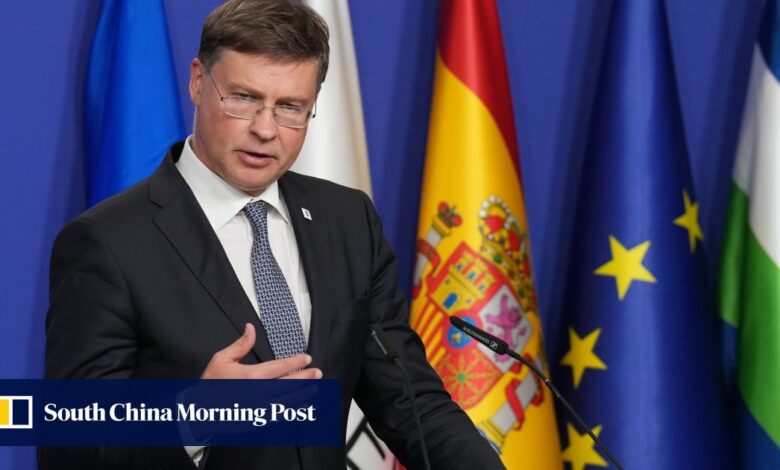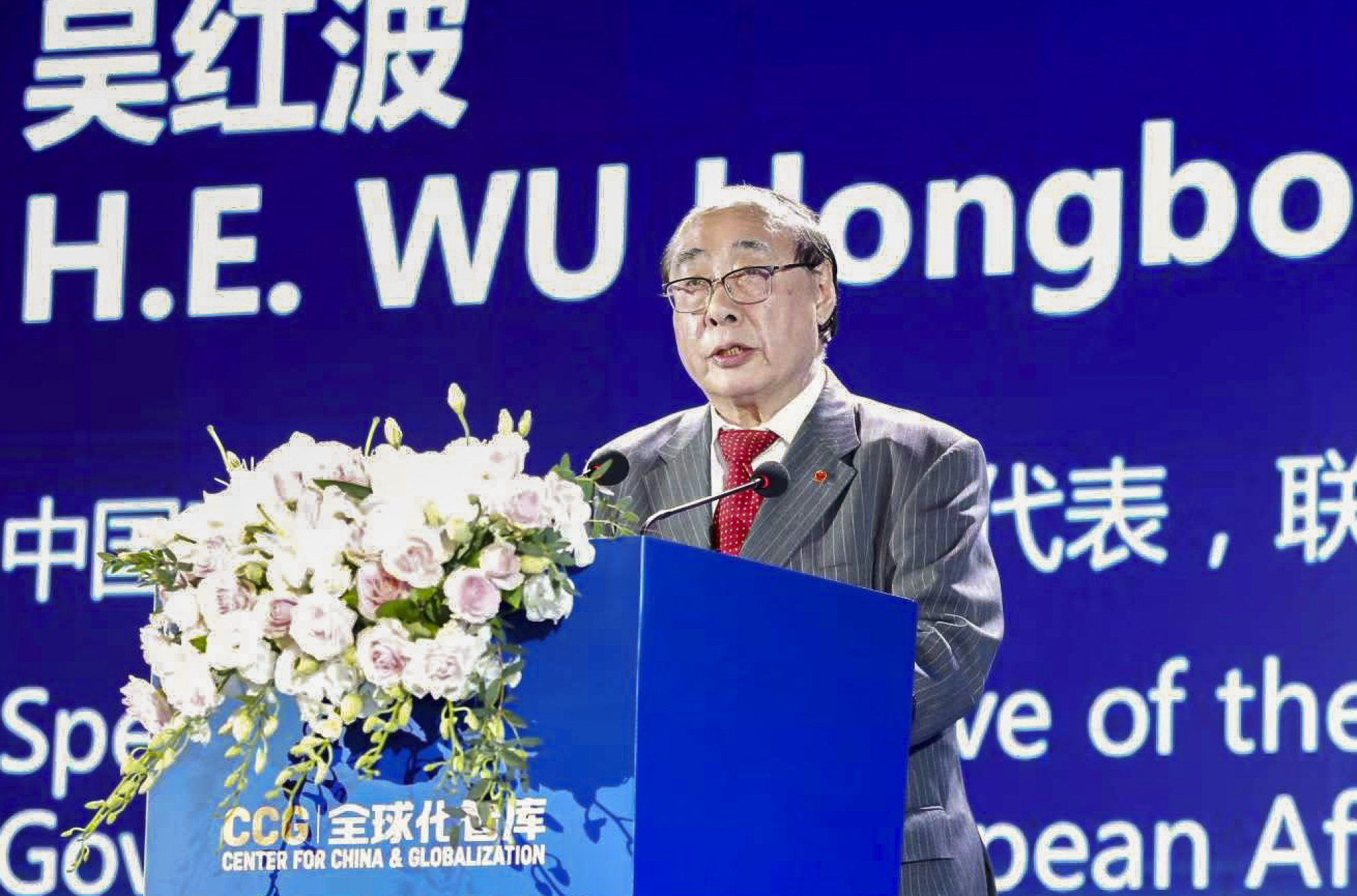EU trade chief heads to China for prickly talks amid EV and de-risking disputes

[ad_1]
Trade is one of the few areas where Brussels sets policy for the EU’s 27 member states, and the soft-spoken Latvian’s term has been synonymous with a more pugnacious EU stance towards China, as geopolitical tensions have flared.
Dombrovskis is to sit down with He Lifeng, the Chinese vice-premier overseeing economic issues, on Monday for talks that, while the centrepiece of the trip, are usually highly structured scripted affairs. Dombrovskis is thought to believe that what happens in the margins is just as important.

Officials and diplomats who have worked in Beijing complain that their counterparts in Brussels have struggled to grasp how much China has changed during President Xi Jinping’s decade at the helm. Others believe that the ailing Chinese economy gives Europe some rare leverage: can Beijing afford to allow strained ties to slip further?
Dombrovskis, then, is seeking a feel for the on-the-ground reality, following four pandemic years during which China cut itself off from the world while growing increasingly assertive on the global stage.
He will hold separate meetings with Commerce Minister Wang Wentao; People’s Bank of China (PBOC) governor Pan Gongsheng; and Finance Minister Liu Kun, most of whom are new to their roles. Part of the challenge will be to determine where the power lies in President Xi Jinping’s third cabinet – if anywhere other than the top of the tree.
EU unafraid of trade war with China amid row over electric vehicle probe
EU unafraid of trade war with China amid row over electric vehicle probe
During these meetings, he is expected to deliver a steely message on Ukraine, discouraging Beijing from contravening or backfilling EU sanctions on Russia. It’s hoped that as a former Latvian prime minister who is not outwardly hostile towards China, Dombrovskis and his directive will carry some weight in Beijing.
He will also lay out Brussels’ trade grievances during speeches at the Bund Summit in Shanghai and Tsinghua University in Beijing.
The speeches will also try to debunk what are seen as misperceptions about the EU’s de-risking policy, a source of serious consternation in China and parts of Europe.
Chinese officials have been dismissive of Brussels’ assertion that the relationship needs to be materially adjusted. They fear that de-risking is a byword for decoupling and regularly repudiate the suggestion that the EU and China are “systemic rivals”.
“Decoupling is the baby of the US, de-risking is invented in Europe, the concept of national security has been overstretched,” Wu Hongbo, Beijing’s special envoy for Europe, said on Thursday. In response, EU’s envoy to China Jorge Toledo Albiñana railed against China’s trade surplus with the EU, which he called the highest in “the history of mankind”.
Chinese envoy takes aim at Europe’s ‘de-risking’, national security fears
Chinese envoy takes aim at Europe’s ‘de-risking’, national security fears
Dombrovskis is expected to reiterate that the policy is narrow in scope and does not involve decoupling. Diplomatic sources said that he favours a more surgical approach to de-risking, at a slower pace than proposed by European Commission chief Ursula von der Leyen, who is pushing to have a policy formulated by year’s end.
François Chimits, a trade analyst at the Mercator Institute for China Studies, said that like the US, “bilateral engagement is foremost to prevent further deterioration” of the EU-China relationship.
Some European businesses, meanwhile, have been reluctant to reduce their lucrative commercial dealings with China and feel they are being squeezed by government policy on both sides.

With this in mind, Dombrovskis will tour the German manufacturer Knorr-Bremse’s brake factory in Suzhou to better understand the challenges European businesses face in China today.
Preparations for the trip have been painstaking: senior members of Dombrovskis’ cabinet spent two days in China last week, meeting with officials from various ministries and the PBOC to make sure the EU official brings home some tangible gains.
The advance party told Chinese counterparts that more than just a photo opportunity was needed, although expectations in Brussels remain low. There is a fear that the row over electric vehicles will overshadow proceedings.
Last week the EU launched a probe into the “flood” of cheap Chinese EVs landing on European shores. The bloc claims to have ample evidence that Chinese car makers were given state subsidies. China has condemned the EU move as “sheer protectionism” and Chinese officials have intimated that EVs will be front and centre of their agenda.
Some fear the row could dilute prospects of even narrow “wins” and embolden hawks in China, who argue against any concessions when the EU is going on the attack.
China’s climate envoy decries trade curbs for ‘politicising’ renewables
China’s climate envoy decries trade curbs for ‘politicising’ renewables
Among the “deliverables” Brussels seeks is the establishment of an early-warning system that would help Europe prepare for bottlenecks in supplies of critical raw materials. Concerned about the bloc’s dependencies on China for a huge swathe of minerals and inputs, officials are fiercely debating about weaning the EU off the Chinese export machine.
There is hope that China will agree to a road map – with a hard deadline – to open its giant market to meat and poultry from all 27 EU members. Only eight countries have such access now.
In financial services, Dombrovskis is expected to lobby to include European firms in pilot programmes allowing them to get their money out of China; a narrow deal to allow EU financial firms to repatriate some of their data is in the works, too.
Brussels is hoping that reform-minded Chinese officials, who fear Beijing’s isolation from the global financial system, retain some clout in an increasingly centralised political apparatus. The initial goal is a working group that would help clarify and expedite data exports for EU businesses, which are puzzled by sweeping new laws.
For its part, China wants to set up an export controls working group – similar to one established for the US when Commerce Secretary Gina Raimondo visited Beijing last month – amid concerns that it will be squeezed out of Western markets for hi-tech goods.
Dombrovskis approved a low-level dialogue on this front when he met with Wang Wentao in Brussels in April. But Beijing seeks a group involving senior officials. With the US, for example, it takes place at the assistant secretary level.
Brussels is open to this proposal provided it gets something in return, but has resisted China’s demands for more collaboration on clean technology.
If nothing else, the trip should remind Dombrovskis of the scale of change in the EU-China relationship. In 2012, People’s Daily ran a photo of Dombrovskis, then a fresh-faced Latvian prime minister, smiling while reading the daily print edition of the Communist Party mouthpiece. And a posting on the Chinese embassy in Latvia’s website showed him welcoming a Huawei Technologies delegation to Riga in 2011.
Both would be considered political suicide in Europe today. But the flurry of diplomacy shows that the EU is keen to keep important guardrails in place as tensions deepen.
There may not be much on “concrete deliverables”, Chimits said, but it’s a “clear signal that both sides are willing to engage and even deepen most economic interactions”.
[ad_2]
Source link





